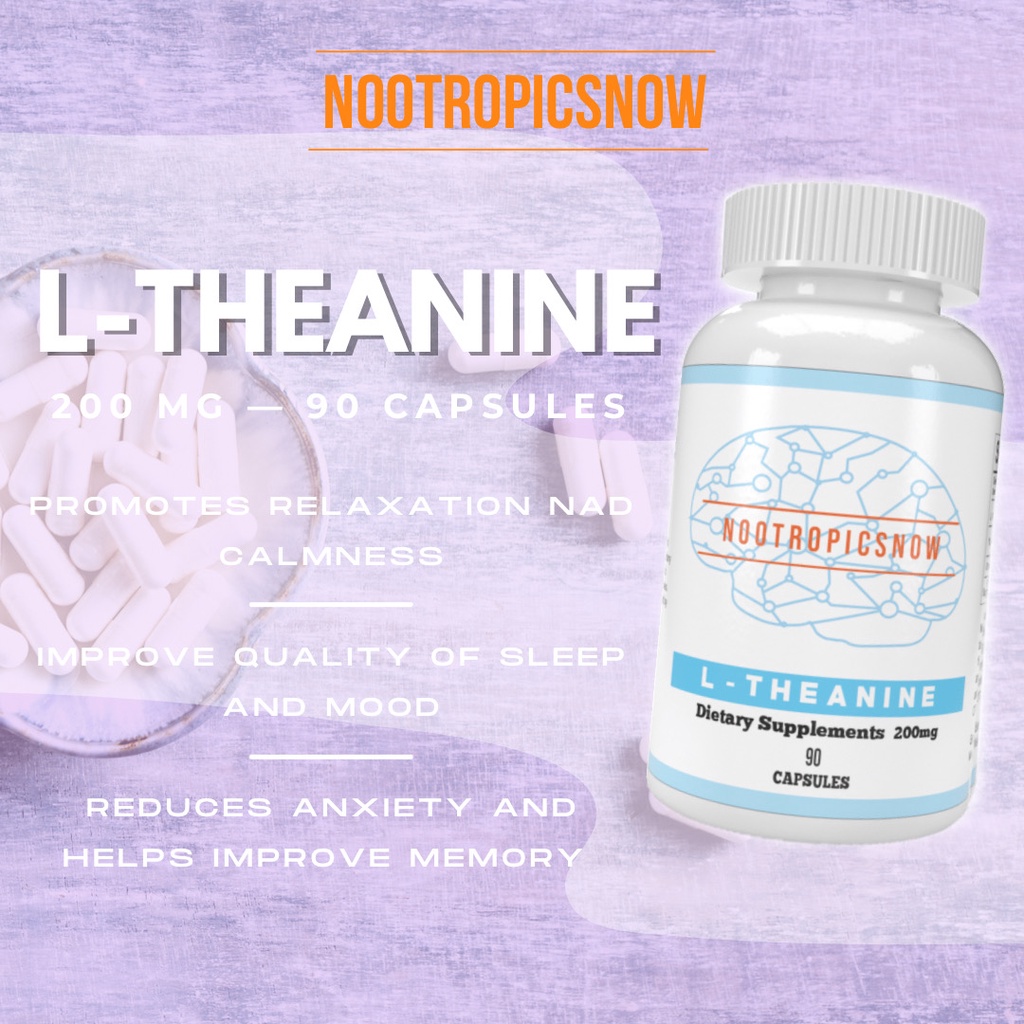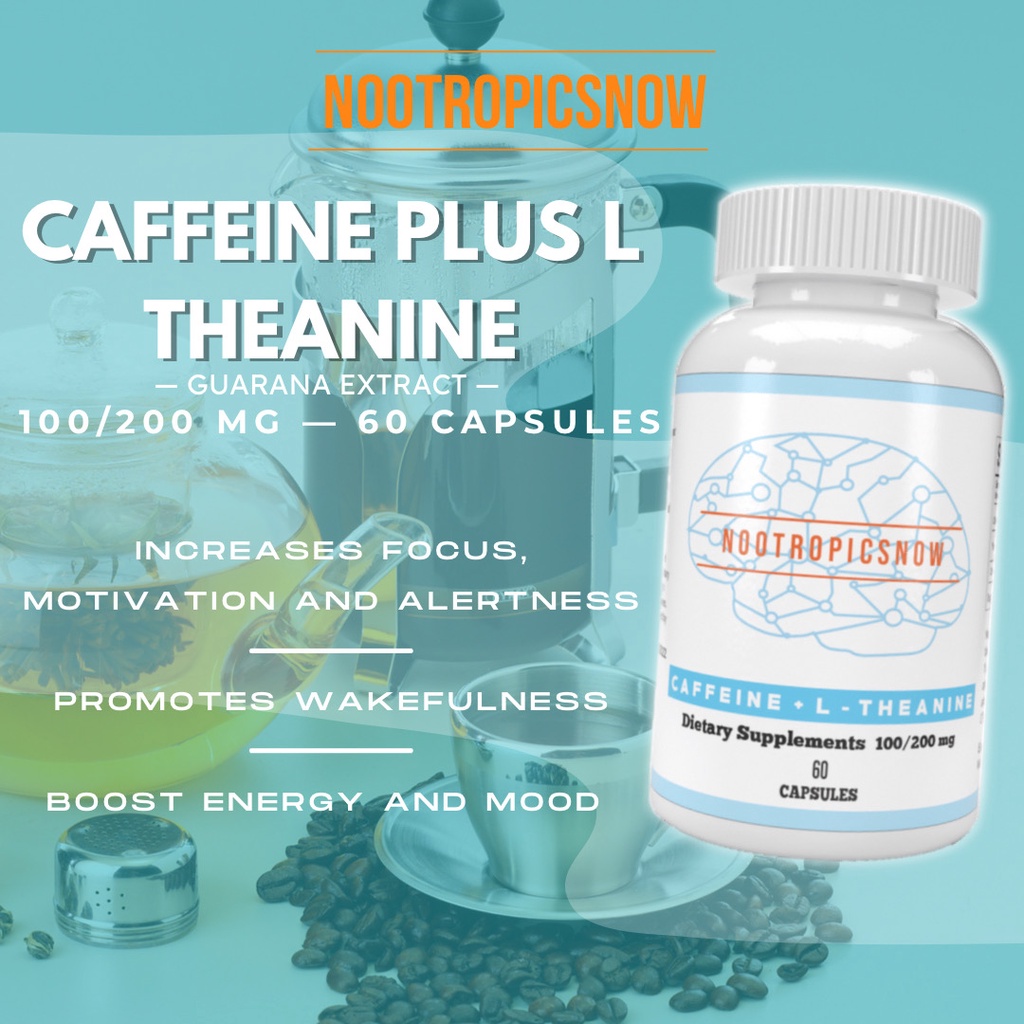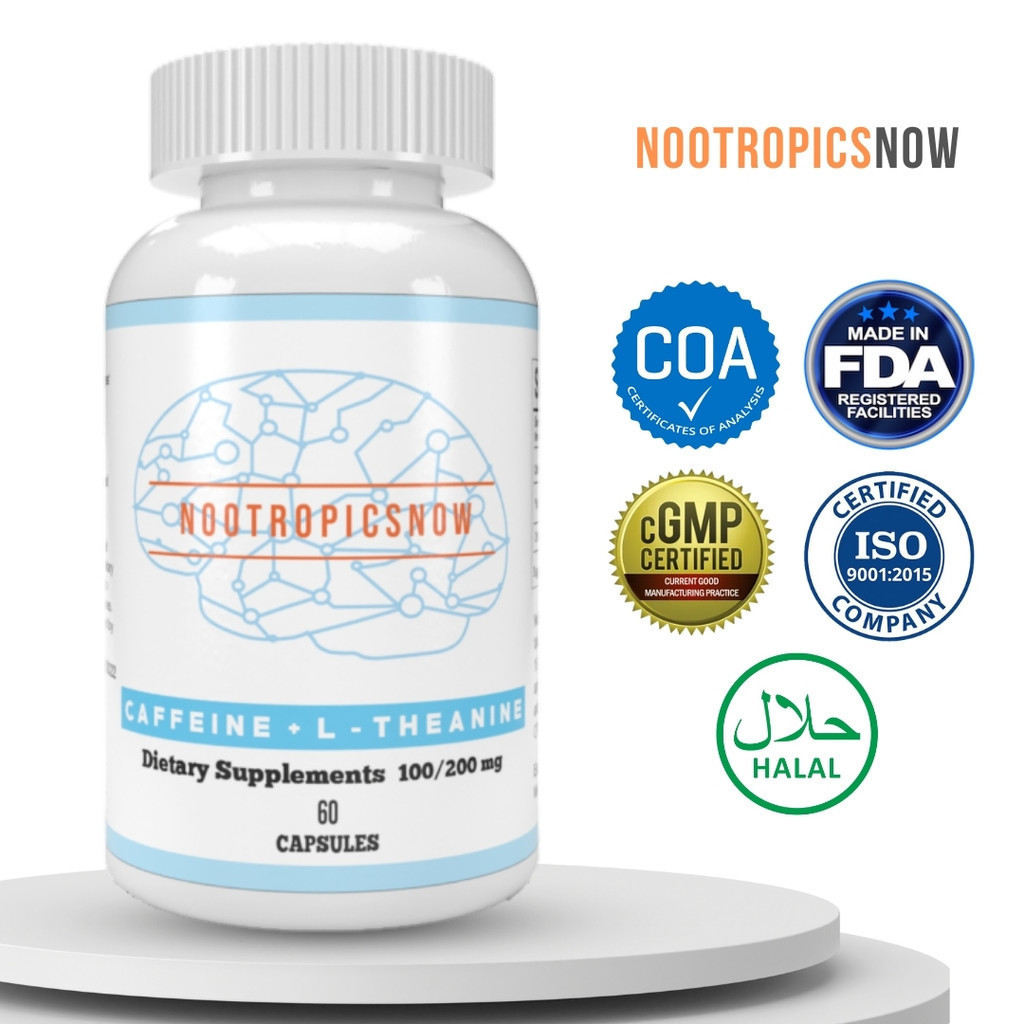L-Theanine & Caffeine: Optimal Dosage

L-Theanine and Caffeine Dosage: Optimizing Cognitive Function and Minimizing Side Effects
The combination of L-theanine and caffeine has gained significant traction in recent years as a natural way to enhance cognitive function. Both compounds have unique properties. When combined, they provide a synergistic effect, offering a smoother and more sustained form of mental energy and focus. However, understanding the correct dosage is crucial to reaping the benefits while minimizing potential side effects. This article delves into the optimal L-theanine and caffeine dosage strategies for cognitive enhancement, performance optimization, and overall well-being.
Understanding L-Theanine and Caffeine Individually
Before exploring the combined effects, let’s examine each compound separately. Understanding their individual mechanisms helps clarify why they work so well together.
L-Theanine: The Relaxation Agent
L-theanine is an amino acid analog commonly found in green tea. Its primary role is to promote relaxation without causing drowsiness. L-theanine achieves this by influencing several neurotransmitters in the brain. Specifically, it increases levels of GABA (gamma-aminobutyric acid), dopamine, and serotonin. These neurotransmitters are vital for regulating mood, sleep, and relaxation.
Furthermore, L-theanine promotes alpha brain wave activity. Alpha waves are associated with a state of “wakeful relaxation,” where the mind is calm yet alert. This mental state is ideal for tasks requiring focus and creativity. Unlike many sedatives, L-theanine doesn’t directly sedate the brain. It simply creates an environment conducive to relaxation and mental clarity. Its neuroprotective properties also contribute to cognitive health over time. L-theanine offers a natural and gentle way to enhance cognitive function.
Here’s a product that can help with that:

View Product
Caffeine: The Stimulation Booster
Caffeine is a well-known stimulant found in coffee, tea, and energy drinks. It primarily works by blocking adenosine, a neurotransmitter that promotes sleepiness and relaxation. By inhibiting adenosine, caffeine increases alertness, reduces fatigue, and enhances cognitive function. Caffeine stimulates the central nervous system. It leads to increased heart rate, blood pressure, and energy levels.
Caffeine enhances mental performance by improving focus, concentration, and reaction time. However, caffeine also has potential drawbacks. These include jitteriness, anxiety, insomnia, and dependency. These side effects can negate the cognitive benefits, especially at higher doses. Thus, caffeine must be used judiciously. The right dose depends on individual tolerance and sensitivity.
The Synergistic Effect: Combining L-Theanine and Caffeine
The real magic happens when L-theanine and caffeine are combined. L-theanine mitigates many of the negative side effects associated with caffeine. It creates a smoother and more sustained energy boost. This combination provides enhanced focus without the jitters or anxiety.
How L-Theanine Counteracts Caffeine’s Side Effects
L-theanine and caffeine work synergistically. It helps in the following ways:
Reduces Jitteriness and Anxiety: L-theanine promotes relaxation. It counteracts the anxiety-inducing effects of caffeine. It helps keep you calm and focused.
Enhances Focus and Concentration: The combination boosts attention spans and cognitive performance. It is more effective than either substance taken alone.
Promotes a Smoother Energy Curve: L-theanine moderates the stimulating effects of caffeine. It prevents the sharp spikes and crashes in energy.
Minimizes Insomnia: L-theanine can help reduce sleep disturbances. It is caused by caffeine consumption later in the day.
Optimal Dosage Ratios: Finding the Sweet Spot
The key to a successful L-theanine and caffeine stack lies in the dosage ratio. While individual responses vary, certain ratios have consistently shown to be effective.
2:1 Ratio (L-Theanine: Caffeine): This is the most commonly recommended ratio. It provides a balanced effect. It allows for caffeine’s cognitive benefits without excessive stimulation. For example, 200mg of L-theanine combined with 100mg of caffeine.
1:1 Ratio (L-Theanine: Caffeine): Some users prefer this ratio for a more pronounced calming effect. It is particularly beneficial for those highly sensitive to caffeine.
4:1 Ratio (L-Theanine: Caffeine): This higher ratio of L-theanine is best for individuals prone to anxiety. It helps prevent any jitteriness from the caffeine.
Ultimately, the ideal ratio depends on personal preference and sensitivity. Start with the 2:1 ratio and adjust based on your own experience. It allows for fine-tuning until you find the balance.
For convenience, consider a combined product:

View Product
Recommended Dosages and Guidelines
While the ratio is important, understanding the specific dosages of each compound is equally crucial. This helps in effectively manage benefits and side effects.
L-Theanine Dosage Guidelines
Typical Range: 100mg to 400mg per day.
Starting Dose: 100mg to 200mg, to assess tolerance.
For Relaxation: 200mg to 400mg. Consume it at a single time. Helps in combating stress.
Timing: Can be taken with or without food. The effects are noticeable within 30 to 60 minutes.
Caffeine Dosage Guidelines
Safe Daily Limit: Up to 400mg for most healthy adults.
Individual Dose: 50mg to 200mg, depending on tolerance.
For Cognitive Enhancement: 100mg is often sufficient. It gives enhanced focus and alertness.
Timing: Avoid consuming caffeine late in the day. It prevents sleep disturbances.
Combining L-Theanine and Caffeine: Practical Examples
Morning Boost: 200mg L-theanine + 100mg caffeine. It allows for an enhanced alertness without jitters.
Midday Focus: 100mg L-theanine + 50mg caffeine. It combats afternoon fatigue. It maintains concentration.
Stressful Situations: 400mg L-theanine + 100mg caffeine. It promotes calm focus. It is during high-pressure periods.
Factors Influencing Optimal Dosage
Several factors can influence the ideal L-theanine and caffeine dosage. These factors include individual sensitivity, tolerance, and lifestyle habits.
Individual Sensitivity
Some individuals are naturally more sensitive to caffeine. Even small amounts can cause anxiety or insomnia. These people may benefit from a higher L-theanine to caffeine ratio. For those less sensitive to caffeine, a lower L-theanine ratio may suffice.
Tolerance
Over time, the body can develop a tolerance to both L-theanine and caffeine. Regular users might require higher doses to achieve the same effects. It is important to cycle off these substances periodically. This maintains their effectiveness and prevents dependency.
Lifestyle and Diet
Lifestyle factors such as sleep habits, diet, and stress levels can also affect the optimal dosage. For instance, individuals who are sleep-deprived or highly stressed might need higher doses of L-theanine to counteract the stimulant effects of caffeine.
Weight
Body weight and metabolism also affects dosage. Typically, individuals with higher body mass index (BMI) might require higher dosages. This accounts for distribution and metabolism.
Potential Side Effects and Precautions
While the combination of L-theanine and caffeine is generally safe, it’s essential to be aware of potential side effects and precautions.
L-Theanine Side Effects
L-theanine is well-tolerated. Side effects are rare. High doses can cause mild gastrointestinal discomfort in some people.
Caffeine Side Effects
Caffeine can cause more pronounced side effects, especially at higher doses. These include:
Anxiety and Jitteriness
Insomnia
Increased Heart Rate
Digestive Issues
Headaches
Precautions
Pregnancy and Breastfeeding: Pregnant or breastfeeding women should consult with a healthcare professional before using L-theanine and caffeine.
Medications: Consult with your doctor. It’s important if you are taking medications. They can interact with caffeine or L-theanine.
Underlying Health Conditions: Individuals with heart conditions, anxiety disorders, or sleep disorders should exercise caution. They should seek medical advice before using these substances.
Maximizing the Benefits: Lifestyle Integration
To fully leverage the cognitive benefits of L-theanine and caffeine, it’s essential to integrate them into a healthy lifestyle.
Sleep Hygiene
Prioritize good sleep habits. Aim for 7-9 hours of quality sleep per night. Avoid caffeine consumption close to bedtime. This ensures that L-theanine and caffeine enhance focus without disrupting sleep patterns.
To aid in sleep, consider:

View Product
Balanced Diet
Consume a balanced diet rich in nutrients. This supports brain health and overall cognitive function. Avoid processed foods, excessive sugar, and unhealthy fats.
Regular Exercise
Engage in regular physical activity. Exercise enhances cognitive function, reduces stress, and improves mood. Aim for at least 30 minutes of moderate-intensity exercise most days of the week.
Stress Management Techniques
Practice stress-reducing activities such as meditation, yoga, or deep-breathing exercises. These can complement the calming effects of L-theanine and further enhance focus and mental clarity.
For added stress relief, look into:

View Product
Choosing the Right Supplements
The quality of L-theanine and caffeine supplements can significantly impact their effectiveness.
L-Theanine Supplements
L-Theanine Form: L-theanine comes in capsules, tablets, and powders. Choose a form that is easy to consume and fits your lifestyle.
Purity and Quality: Opt for supplements from reputable brands that undergo third-party testing for purity and potency.
Additives: Check the ingredient list for unnecessary additives or fillers. Select products with minimal ingredients to ensure the highest quality.
Caffeine Supplements
Forms of Caffeine: Caffeine is available in various forms. These include caffeine pills, powders, and anhydrous caffeine.
Controlled Release: Consider controlled-release caffeine supplements. They provide a more sustained energy boost without the crash.
Natural Sources: Some people prefer natural sources of caffeine, such as green tea extract or guarana. They offer additional health benefits.
Here’s a product with green tea extract:

View Product
Stacking with Other Nootropics
L-theanine and caffeine can be combined with other nootropics to further enhance cognitive function.
Popular Stacks
L-Theanine, Caffeine, and Bacopa Monnieri: Supports memory and cognitive function.
L-Theanine, Caffeine, and Rhodiola Rosea: Provides additional stress reduction. Also enhances mental endurance.
L-Theanine, Caffeine, and Creatine: Enhances physical and mental performance.
Considerations
Research: Thoroughly research any additional nootropics. It’s important before combining them.
Start Slow: Introduce new substances gradually. Monitor for side effects.
Consult a Professional: Seek advice from a healthcare professional. Do it to optimize your stack.
A bacopa supplement you might like:

View Product
Future Research Directions
While the current research supports the benefits of combining L-theanine and caffeine, more studies are needed to fully understand their long-term effects and potential applications.
Areas for Further Investigation
Long-Term Cognitive Benefits: Evaluate the sustained cognitive benefits of long-term L-theanine and caffeine use.
Specific Populations: Investigate the effects on specific populations, such as older adults or individuals with cognitive impairments.
Dosage Optimization: Conduct more research. Optimize the L-theanine and caffeine ratios for different cognitive tasks.
Conclusion: Harnessing the Power of L-Theanine and Caffeine
The combination of L-theanine and caffeine offers a powerful and natural way to enhance cognitive function, improve focus, and reduce stress. By understanding the individual properties of each compound, finding the optimal dosage ratio, and integrating them into a healthy lifestyle, individuals can unlock their cognitive potential and achieve peak performance. As with any supplement, it’s crucial to approach their use with caution, monitor for side effects, and consult with a healthcare professional to ensure safety and effectiveness. The synergistic partnership of L-theanine and caffeine paves the way for a clearer, calmer, and more focused mind.
L-Theanine and Caffeine Dosage: A Comprehensive Guide to Optimizing Cognitive Function
L-theanine and caffeine represent a powerful synergistic combination, promising enhanced focus, heightened cognitive performance, and a smoother energy profile compared to caffeine alone. However, maximizing the benefits of this stack hinges on understanding optimal dosages, individual sensitivities, and the interplay between these two compounds. This section provides a detailed guide to navigating the world of L-theanine and caffeine dosage, offering practical advice and scientific insights.
Understanding the Synergy: How L-Theanine and Caffeine Interact
Caffeine, a ubiquitous stimulant found in coffee, tea, and energy drinks, primarily works by blocking adenosine receptors in the brain. Adenosine is a neurotransmitter that promotes relaxation and sleepiness; therefore, blocking its action leads to increased alertness and reduced fatigue. However, this stimulation can often be accompanied by undesirable side effects, including anxiety, jitteriness, and difficulty sleeping.
L-theanine, an amino acid primarily found in green tea, offers a counterbalancing effect. It promotes relaxation without causing drowsiness, primarily by influencing alpha brain wave activity, which is associated with a calm, focused state. L-theanine also modulates the effects of neurotransmitters such as dopamine and serotonin, contributing to improved mood and stress reduction.
The synergy between L-theanine and caffeine arises from their complementary actions. L-theanine mitigates the negative side effects of caffeine while enhancing its positive cognitive benefits. Specifically, it reduces anxiety and jitteriness, promotes relaxation, and improves focus, creating a state of calm alertness that is ideal for productivity and cognitive performance.
Optimal L-Theanine to Caffeine Ratios: Finding Your Sweet Spot
Determining the optimal dosage ratio of L-theanine to caffeine is crucial for achieving the desired synergistic effects. While individual responses can vary, the scientific literature and anecdotal evidence suggest a few key ratios:
2:1 Ratio (L-Theanine:Caffeine): This is arguably the most commonly recommended and researched ratio. It involves taking twice as much L-theanine as caffeine. For example, 200mg of L-theanine alongside 100mg of caffeine. This ratio is generally considered effective for reducing caffeine-induced anxiety and jitteriness while maintaining focus and alertness. Many find this ratio to be well-tolerated and effective for daily use.

View Product-Nootropic-Brain-Support-Booster-Memory-Sleep-Supplement-i.202321183.5451568422)
1:1 Ratio (L-Theanine:Caffeine): Some individuals prefer a more balanced ratio, using equal amounts of L-theanine and caffeine. For example, 100mg of L-theanine alongside 100mg of caffeine. This ratio might be suitable for those who are less sensitive to caffeine or who prefer a more subtle calming effect. It’s often a good starting point for experimentation to gauge individual sensitivity.

View Product-(60-capsules-30-servings)-Nootropic-Brain-Booster-i.202321183.4251327469)
3:1 or Higher Ratio (L-Theanine:Caffeine): Individuals particularly sensitive to the side effects of caffeine may benefit from an even higher ratio of L-theanine. This might involve 300mg or more of L-theanine alongside 100mg of caffeine. This approach prioritizes minimizing anxiety and promoting relaxation, even if it means slightly reducing the stimulating effects of caffeine.
Ultimately, the optimal ratio is highly individual and depends on factors such as caffeine sensitivity, desired level of stimulation, and individual biochemistry. Experimentation is key to finding the ratio that works best for you.
Recommended Dosage Ranges: Tailoring Your Intake
Beyond the ratio, understanding the appropriate dosage ranges for both L-theanine and caffeine is essential. Here’s a breakdown of recommended ranges and considerations:
L-Theanine Dosage
General Cognitive Enhancement: For enhancing focus and reducing anxiety, a typical dose ranges from 100mg to 400mg per day. Many users find that 200mg taken with caffeine provides a noticeable improvement in cognitive function.

View Product
Anxiety Reduction: Higher doses, up to 400mg, may be used to manage anxiety symptoms. L-theanine is generally well-tolerated, even at higher doses, but it’s always advisable to start with a lower dose and gradually increase as needed.
Sleep Improvement: While primarily known for its calming effects during the day, L-theanine can also be taken before bed to promote relaxation and improve sleep quality. A dose of 200-400mg taken 30-60 minutes before bedtime may be beneficial.
Individual Sensitivity: Some individuals may be more sensitive to L-theanine and experience drowsiness or mild headaches at higher doses. If this occurs, reduce the dose accordingly.
Caffeine Dosage
General Cognitive Enhancement: For cognitive enhancement, a moderate dose of caffeine, typically ranging from 40mg to 200mg, is generally sufficient. The equivalent of one to two cups of coffee, depending on the strength, falls within this range.
FDA Recommendations: The Food and Drug Administration (FDA) recommends that most adults limit their caffeine intake to a maximum of 400mg per day. Exceeding this limit can lead to adverse effects such as insomnia, anxiety, jitteriness, and increased heart rate.
Individual Sensitivity: Caffeine sensitivity varies significantly among individuals. Some people are highly sensitive and experience side effects even at low doses, while others can tolerate much higher amounts without any noticeable problems.
Timing: The timing of caffeine intake is also important. Avoid consuming caffeine late in the day, as it can interfere with sleep. It’s generally best to take caffeine earlier in the day to maximize its benefits without disrupting sleep patterns.
Practical Considerations: Maximizing Benefits and Minimizing Risks
Beyond understanding dosages and ratios, several practical considerations can further optimize the use of L-theanine and caffeine:
Start Low and Go Slow: Begin with lower doses of both L-theanine and caffeine to assess your individual tolerance and sensitivity. Gradually increase the dosage as needed, monitoring for any adverse effects.
Pay Attention to Timing: Take L-theanine and caffeine together for synergistic cognitive benefits. Avoid taking caffeine late in the day to prevent sleep disruption. Consider taking L-theanine separately in the evening to promote relaxation and improve sleep quality.
Hydration is Key: Caffeine is a diuretic and can lead to dehydration. Ensure you drink plenty of water throughout the day to stay hydrated.
Cycle Your Intake: To prevent tolerance, consider cycling your intake of L-theanine and caffeine. Take breaks of a few days or weeks to allow your body to resensitize to their effects.
Consider Food Intake: Consuming caffeine on an empty stomach can exacerbate its side effects. Taking it with food, particularly a balanced meal containing protein and carbohydrates, can help slow down absorption and reduce the risk of jitteriness.
Choose Quality Supplements: Select high-quality L-theanine and caffeine supplements from reputable brands to ensure purity and accurate dosing.

View Product
Be Mindful of Hidden Caffeine Sources: Be aware of hidden caffeine sources in foods and beverages, such as chocolate, soda, and certain medications. These can contribute to your overall caffeine intake and potentially lead to unwanted side effects.
Listen to Your Body: Pay attention to how your body responds to L-theanine and caffeine. Adjust your dosage and timing based on your individual needs and preferences. If you experience any adverse effects, such as anxiety, insomnia, or digestive issues, reduce or discontinue use.
Consult a Healthcare Professional: If you have any underlying health conditions, are taking medications, or are pregnant or breastfeeding, consult with a healthcare professional before taking L-theanine and caffeine.
Scientific Evidence: Supporting the Benefits of L-Theanine and Caffeine
The synergistic benefits of L-theanine and caffeine are supported by a growing body of scientific evidence. Here are some key findings from research studies:
Improved Cognitive Performance: Multiple studies have shown that the combination of L-theanine and caffeine improves cognitive performance, including attention, focus, memory, and reaction time. For example, a study published in the journal Nutritional Neuroscience found that a combination of 97mg of L-theanine and 40mg of caffeine improved accuracy and alertness during a sustained attention task.
Reduced Anxiety and Stress: L-theanine has been shown to reduce anxiety and stress, particularly when combined with caffeine. A study published in the Journal of Functional Foods found that L-theanine significantly reduced stress and improved cognitive performance in individuals performing a mentally demanding task.
Enhanced Mood: L-theanine can improve mood and reduce symptoms of depression and anxiety. A study published in the Asia Pacific Journal of Clinical Nutrition found that L-theanine supplementation improved mood and reduced anxiety in healthy volunteers.
Improved Sleep Quality: L-theanine can promote relaxation and improve sleep quality. A study published in the Journal of the American College of Nutrition found that L-theanine supplementation improved sleep efficiency, sleep latency, and overall sleep quality in children with ADHD.
Neuroprotective Effects: L-theanine has been shown to have neuroprotective effects, protecting brain cells from damage and promoting brain health. Studies have shown that L-theanine can protect against oxidative stress, inflammation, and excitotoxicity, all of which can contribute to neurodegenerative diseases.
Potential Side Effects and Interactions: Awareness is Key
While L-theanine and caffeine are generally considered safe, it’s important to be aware of potential side effects and interactions:
L-Theanine Side Effects
Mild Headache: Some individuals may experience mild headaches, particularly at higher doses.
Drowsiness: While L-theanine primarily promotes relaxation without drowsiness, some individuals may experience mild sedation, especially at higher doses.
Gastrointestinal Upset: Rarely, L-theanine may cause mild gastrointestinal upset, such as nausea or stomach discomfort.
Caffeine Side Effects
Anxiety and Jitteriness: Caffeine can cause anxiety, jitteriness, and nervousness, particularly in sensitive individuals.
Insomnia: Caffeine can interfere with sleep and cause insomnia, especially when consumed late in the day.
Increased Heart Rate and Blood Pressure: Caffeine can increase heart rate and blood pressure, which may be a concern for individuals with cardiovascular conditions.
Digestive Issues: Caffeine can cause digestive issues, such as heartburn, acid reflux, and diarrhea.
Withdrawal Symptoms: Abruptly stopping caffeine intake can lead to withdrawal symptoms, such as headache, fatigue, and irritability.
Interactions
Stimulant Medications: Caffeine can interact with stimulant medications, such as those used to treat ADHD, potentially increasing their effects and side effects.
Anxiety Medications: L-theanine may interact with anxiety medications, potentially enhancing their effects.
Blood Pressure Medications: Caffeine may interact with blood pressure medications, potentially reducing their effectiveness.
Conclusion: Personalize Your Approach to Maximize Cognitive Potential
L-theanine and caffeine offer a powerful synergistic combination for enhancing cognitive function, reducing anxiety, and promoting a state of calm alertness. However, maximizing the benefits of this stack requires a personalized approach that takes into account individual sensitivities, optimal dosages, and potential side effects. By following the guidelines outlined in this comprehensive guide, you can safely and effectively harness the power of L-theanine and caffeine to unlock your cognitive potential. Remember to start low, go slow, listen to your body, and consult with a healthcare professional if you have any concerns.








